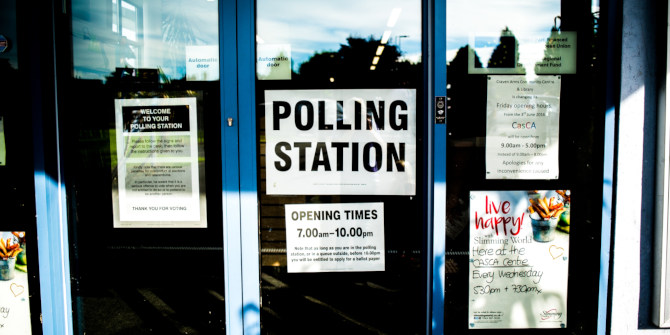 Following the resignation of Romania’s Prime Minister, Victor Ponta, a new ‘technocratic’ government led by former European Commissioner Dacian Cioloș entered office on 17 November. Neculai-Cristian Surubaru assesses some of the key challenges facing the new government. He argues the government may have a limited window of opportunity to implement reforms, but that it is becoming increasingly clear Romania’s established political parties are now facing significant public opposition, particularly from younger generations of Romanians.
Following the resignation of Romania’s Prime Minister, Victor Ponta, a new ‘technocratic’ government led by former European Commissioner Dacian Cioloș entered office on 17 November. Neculai-Cristian Surubaru assesses some of the key challenges facing the new government. He argues the government may have a limited window of opportunity to implement reforms, but that it is becoming increasingly clear Romania’s established political parties are now facing significant public opposition, particularly from younger generations of Romanians.
Recent developments taking place in Romania present an interesting case for students of politics. Following the Colectiv club tragedy in Bucharest, manay people took to the streets to protest against corruption and what they saw as the irresponsibility of government officials in dealing with the disaster. In many ways, what they were rallying against was the dysfunctional nature of state institutions.
The events opened a new window of opportunity and for several days it was felt that the contract between society and the state was being renegotiated. Reinventing the polity was a core demand of many of the young people that took to the streets. One year before, a similar window of opportunity had emerged when Klaus Iohannis was elected as President of the country in November 2014.
On the back of the protests, and following pressure from members of his own Social Democratic party (PSD), Victor Ponta resigned as Prime Minister. It was the first major internal political crisis that president Klaus Iohannis had been forced to deal with. According to the constitution, he had to nominate a new head of government with, ideally, the nomination receiving agreement from all parliamentary forces. Iohannis organised several consultations with the main parliamentary political parties, as well as representatives of civil society (a novel development).
Before a final decision was made public, there were many internal and public quarrels on the nature of the new government. Against this backdrop, some relatively inconclusive evidence appeared to suggest that many Romanians favoured a politically neutral and technocratic government. The Romanian President duly took this on board and nominated a former European Commissioner – Dacian Cioloş – to form the new government.
Romania’s ‘technocratic’ government
Following the publication of the new list of potential ministers, it became evident that many of those nominated were not in fact technocrats in the strictest sense of the term. The Cioloş government is at best a patch-work which includes some political heavy weights, EU-oriented technocrats and a few civil society representatives. Yet, many were baffled by the appointment of a 28 year old resident physician and male model (Andrei Baciu) with close ties to a National Liberal (PNL) member of the European Parliament (Cristian Buşoi).
This nomination provided a glimpse into the secret deals reached between the President, the new Prime Minister and members of the political class, in order for the latter to convey their support in Parliament. The deal allowed some people working in the “system” to obtain a ministerial office. For instance, the minister for regional development, Vasile Dâncu, has close ties to the leadership of the Social Democrats.
In addition to these examples, several Brussels based professionals were incorporated in the new government. These individuals worked mainly at the European Commission and for the Romanian Permanent Representation. This has constituted a second political novelty for the country over the last few weeks, and possibly with little precedent in other EU nations. These ‘Euro-technocrats’ are believed to be more reformist in character and were potentially hand-picked by the designated Prime Minister.
Finally, several members of civil society organisations were nominated for office, including the head of the American Freedom House NGO, Cristina Guseth. Her nomination was however withdrawn after a poor showing during the questioning process in parliament, which she nevertheless passed. This was yet another sign that MPs were instructed to vote en masse for the new government, even at the parliamentary hearings stage.
Two factors are apparent in these developments. First, members of the new cabinet were selected in a somewhat hasty manner, with no rigorous selection principles in place and, unfortunately, not in a very transparent manner. Second, the new government is largely a patch-work that reflects the compromise reached by President Iohannis with members of the political class, which was necessary in order to safeguard political support for the new Prime Minister.
Despite this fact, there are still many potential reformists and new faces running major ministries. The key issue is the extent to which the new cabinet will have the ability to manage their ministries effectively, and the degree to which their work will be inherited from their predecessors.
Governing the dysfunctional state: the different faces of politicisation
The concept of the ‘dysfunctional state’ is illuminating in the Romanian case. There are several streams of academic literature focusing on issues of state governance and these streams all deal with the idea of dysfunctional and poorly governed countries. Yet politics lies at the core of this dysfunctionality and is mediated by processes of politicisation.
Positive politicisation would be the ability of politicians to provide guidance and support to the state apparatus, in line with various political principles. By contrast, negative politicisation is not only the inability or unwillingness to provide such support, but can also refer to the adoption of measures or corrupt behaviour that will affect the functioning of state institutions. Overall, we can see politicisation as a wider societal phenomenon in which politicians will seek to influence, or hold a strong grip, on many aspects of state governance.
Three very different examples from Romanian contemporary developments may provide an insight into the way negative politicisation may manifest. First, the presidential elections of November 2014 were criticised for being poorly organised abroad on the basis that this would prevent the Romanian diaspora from expressing its clear political choice for Iohannis. And, indeed, there was some reasonable evidence showing that the government, led at the time by the presidential favourite Victor Ponta, did not allocate sufficient resources to polling stations outside the country.
Second, there has been a notably poor performance on the part of the Romanian authorities in managing and absorbing European funds, particularly the 19.6 billion euros of Structural Funds it was allocated for 2007-2013. Here, previous research has shown that a lack of political support towards specialised institutions has damaged the latter’s ability to manage these resources.
Third, the recent tragedy at the Colectiv club fire has shown how several state institutions (local city hall, Department for Emergency – ISU), as well as private firms, simply ignore rules in the area of health and safety. In this context, some investigators have followed petty corruption leads in which club and bar licences have been granted in exchange for bribes to local officials and even safety inspectors.
Overall, the negative role played by political officials is the glue that links all these different events together. Politicisation affects the nature of many state institutions, rendering them dysfunctional. With all this, it must be said that representatives of the above institutions, be they diplomatic staff, public funds administrators, local civil servants or firemen/doctors, are to a good extent capable of carrying out their duties in a professional manner.
The importance of politicisation is that it prevents this from happening. It renders their work obsolete or channels their energy towards achieving politicised goals. Therefore, one can argue that at the core of this dysfunctional state is simply the inability of political elites to provide decent leadership, guidance and solutions. Given all this, the question is how will the new Romanian government manage to fulfil its role?
The challenges awaiting the new government
Several key challenges await the new ‘technocratic’ government. First, given its limited political mandate and its image as a transition government, Dacian Cioloş and his associates will have limited capacity to enact substantial reforms. Its brief governing programme was watered down several times since being launched. For instance, the provisions for urgently amending legislation on electing mayors and heads of County Councils (in two rounds) was taken out, most probably due to political pressure.
This may show the extent to which parliamentary political forces are keen to limit the damage that the new government may be able to inflict on them. Given that Romanian administrative changes may only be instilled through new legislation, the Parliament will take advantage of its role as veto player and block any legislation that will be seen as “dangerous”.
Second, every Romanian child learns in school about the great fights between the Romanian Voivodes and the Ottoman Empire. When faced with the threat of war, one strategy adopted by the first was to scorch the land and poison fountain water so that the invaders would be slowed down in their advance. To a great extent this is a strategy adopted by many Romanian politicians when vacating office. Many of the problems that the new government will inherit may take years, or a radically different approach, to solve.
For example, the Ministry of Transport has been one of the most politicised administrative bodies in the country. Its satellites, such as the Romanian National Highway Company (CNADNR) and the Romanian Railway Company (CFR), have suffered from years of mismanagement, corruption and acute politicisation. Reforming these companies is an incredibly difficult task that not even a strongly mandated political government would aim to tackle.
Third, many second-level political officials are political party associates. Liviu Dragnea, the head of the PSD, has publicly stated that the new Prime Minister will not (be allowed to) replace politically associated personnel. In many ways, the functioning of state institutions is hampered by the negative role played by affiliate political staff. In exchange for political support, the new government has vowed not to carry out what was blatantly referred to as “administrative purges” of political personnel. The technocrats of the cabinet may face strong resistance from many of these political affiliates, who often hold the political keys to Ministries, drawing on clientelistic ties in order to reinforce their status.
Finally, Romanian civil servants are used to political changes and know what these entail for the public administration as a whole. The lack of assumed responsibility or a general sense of apathy among many of those working in the local and central public administration can clearly be linked to processes of negative politicisation. One of the greatest difficulties for the new government will be to motivate civil servants. The new government programme talks about a “professionalisation of the public administration” and carrying out “evaluations based on competence and performance”. Although these principles were always on the public agenda for public administration reform, they were never carried out. The potentially short life span of the Cioloş government may not help solve this issue.
Any hope for reform?
One of the key achievements of the recent street protests was that they highlighted the inability of the political class to manage state institutions. This dysfunctionality was one of the core concerns of demonstrators, generally captured by the slogan ‘corruption kills’. One year after being elected as President, Klaus Iohannis has reiterated that there is a need for a reformed political class. In his view, often expressed through social media, new political movements and parties are necessary to challenge the current establishment.
Street protesters and/or civil society representatives were particularly polarised on this issue. It is increasingly difficult to imagine new political movements emerging from ‘the street’. Although some innovative forms of citizen consultations did develop during the protests, they did not yet materialise in any political movements.
What is clear for many established political parties is that the status quo cannot hold. Street protests, regular consultations with civil society and a good display of management skills from the new government may put more pressure on them to reform. Some parties have stated that they will put forward new faces during the upcoming elections in 2016. There are thus some signs that old parties are willing to at least adopt changes in principle, superficial though they may be.
Whatever the case may be, the new Cioloş government will have to act quickly. It has a limited window of opportunity to deliver on some promised, yet limited, reforms. It will act under the constant threat of internal political sabotage or external political opposition from the parliament, and its legitimacy will be easily eroded if it doesn’t deliver results. This will give heart to those political parties sitting on the outside who would like to regain power and return to business as usual. In that case, street protests may again be the only viable option for those trying to reshape Romanian politics.
Please read our comments policy before commenting.
Note: This article gives the views of the author, and not the position of EUROPP – European Politics and Policy, nor of the London School of Economics. Featured image: Dacian Cioloş at an EPP Congress. Credits: European People’s Party / Wikimedia Commons.
Shortened URL for this post: http://bit.ly/1R549h7
_________________________________
 Neculai-Cristian Surubaru – Loughborough University
Neculai-Cristian Surubaru – Loughborough University
Neculai-Cristian Surubaru is a PhD candidate in Political Science at Loughborough University. His current research deals with administrative and state capacity, the governance of European funding in Central and Eastern Europe, and the implications of European Union membership for Bulgaria and Romania. He teaches at the Loughborough University and at the University of Edinburgh.






Forgot to mention the “decimation” of PSD (voted the largest political party in Romania opposing EPP led presidential PNL “opposition” ) by “Anti-Corruption” Department. In fact, Romania also becomes a dysfunctional state because the administration and legislators are refusing ( fearing) to assume any kind of responsibility or sign any kind of paper because of (Anti-Corruption) prosecutors.